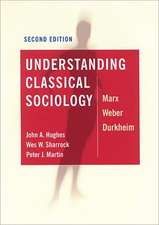Social Morphogenesis
Editat de Margaret S. Archeren Limba Engleză Hardback – 20 mar 2013
| Toate formatele și edițiile | Preț | Express |
|---|---|---|
| Paperback (1) | 778.45 lei 6-8 săpt. | |
| SPRINGER NETHERLANDS – 7 mar 2015 | 778.45 lei 6-8 săpt. | |
| Hardback (1) | 784.48 lei 6-8 săpt. | |
| SPRINGER NETHERLANDS – 20 mar 2013 | 784.48 lei 6-8 săpt. |
Preț: 784.48 lei
Preț vechi: 956.68 lei
-18% Nou
Puncte Express: 1177
Preț estimativ în valută:
150.15€ • 154.74$ • 126.76£
150.15€ • 154.74$ • 126.76£
Carte tipărită la comandă
Livrare economică 01-15 martie
Preluare comenzi: 021 569.72.76
Specificații
ISBN-13: 9789400761278
ISBN-10: 9400761279
Pagini: 240
Ilustrații: VI, 231 p. 14 illus.
Dimensiuni: 155 x 235 x 22 mm
Greutate: 0.51 kg
Ediția:2013
Editura: SPRINGER NETHERLANDS
Colecția Springer
Locul publicării:Dordrecht, Netherlands
ISBN-10: 9400761279
Pagini: 240
Ilustrații: VI, 231 p. 14 illus.
Dimensiuni: 155 x 235 x 22 mm
Greutate: 0.51 kg
Ediția:2013
Editura: SPRINGER NETHERLANDS
Colecția Springer
Locul publicării:Dordrecht, Netherlands
Public țintă
ResearchCuprins
Chapter 1. Introduction: Social Morphogenesis and the Prospects of Morphogenic Society; Margaret S. Archer.- PART I. SOCIAL CHANGE AS MORPHOGENESIS.- Chapter 2. Morphogenesis and Social Change; Douglas V. Porpora.- Chapter 3. The Morphogenetic Approach and the Idea of Morphogenetic Society. The Role of Regularities; Andrea M. Maccarini.- Chapter 4. Emergence and Morphognesis: Causal Reduction and Downward Causation; Tony Lawson.- Chapter 5 Morphogenesis, Continuity and Change in the International Political System; Colin Wight.- PART II. SOCIAL FORMATIONS AND THEIR RE-FORMATION.- Chapter 6. Self-Organization: What is it, What isn't it and What's it Got to Do with Morphogenesis; Kate Forbes-Pitt.- Chapter 7. Self-Organization as the Mechanism of Development and Evolution in Social Systems; Wolfgang Hofkirchner.- Chapter 8. Morphogenetic Society: Self-Government and Self-Organization as Misleading Metaphors; Maragaret S. Archer.- PART III. SOCIAL NETWORKS: LINKAGES OR BONDS.- Chapter9. Network Analysis and Morphogenesis: A Neo-Structural Exploration and Illustration; Emmanuel Lazega.- Chapter 10. Authority's Hidden Networks: Obligations, Roles and the Morphogenesis of Authority; Ismael Al-Amoudi.- Chapter 11. Morphogenesis and Social Networks: Relational Steering not Mechanical Feedback; Pierpaolo Donati.
Recenzii
“Social Morphogenesis is the first volume in a series of books, edited by Margaret Archer, that seeks to develop an explanatory framework that can account for how the rate of social change has ‘speeded up’ in the last three decades. … I found each discussion incredibly valuable. The contributions made here have sharpened my understanding of morphogenesis as a meta-theory, which is providing the grounds for a sensible discussion on the future direction of society.” (Tom Brock, The Sociological Imagination, sociologicalimagination.org, March, 2015)
“Margaret Archer's contribution to critical realism has been an important part of the recent progress of the field, and her theory of morphogenesis is key to this progress. Her recent volume, Social Morphogenesis, represents a rigorous and serious step forward in the project of articulating this theory as both ameta-theory for the social sciences and a potential contribution to sociological theory.” (Understanding Society, understandingsociety.blogspot.de, May, 2014)
“Margaret Archer's contribution to critical realism has been an important part of the recent progress of the field, and her theory of morphogenesis is key to this progress. Her recent volume, Social Morphogenesis, represents a rigorous and serious step forward in the project of articulating this theory as both ameta-theory for the social sciences and a potential contribution to sociological theory.” (Understanding Society, understandingsociety.blogspot.de, May, 2014)
Notă biografică
Margaret Archer heads the project at EPFL 'From Modernity to Morphogenesis'. She was elected as the first woman President of the International Sociological Association at the 12th World Congress of Sociology. She is a founder member of both the Pontifical Academy of Social Sciences and the Academy of Learned Societies in the Social Sciences and is a trustee of the Centre for Critical Realism. She studied at the University of London, graduating B.Sc. in 1964 and Ph.D. in 1967 with a thesis on The Educational Aspirations of English Working Class Parents. She was a lecturer at the University of Reading from 1966 to 1973. She is one of the most influential theorists in the critical realist tradition. At the 12th World Congress of Sociology, she was elected as the first woman President of the International Sociological Association, is a founder member of both the Pontifical Academy of Social Sciences and the Academy of Learned Societies in the Social Sciences. She is a Trustee of the Centrefor Critical Realism.
Textul de pe ultima copertă
The rate of social change has speeded up in the last three decades, but how do we explain this? This volume ventures what the generative mechanism is that produces such rapid change and discusses how this differs from late Modernity. Contributors examine if an intensification of morphogenesis (positive feedback that results in a change in social form) and a corresponding reduction in morphostasis (negative feedback that restores or reproduces the form of the social order) best captures the process involved.
This volume resists proclaiming a new social formation as so many books written by empiricists have done by extrapolating from empirical data. Until we can convincingly demonstrate that a new generative mechanism is at work, it is premature to argue what accounts for the global changes that are taking place and where they will lead. More concisely we seek to answer the question whether or not current social change can be regarded as social morphogenesis. Only then, in the next volumes will the same team of authors be able to remove the question mark.
This volume resists proclaiming a new social formation as so many books written by empiricists have done by extrapolating from empirical data. Until we can convincingly demonstrate that a new generative mechanism is at work, it is premature to argue what accounts for the global changes that are taking place and where they will lead. More concisely we seek to answer the question whether or not current social change can be regarded as social morphogenesis. Only then, in the next volumes will the same team of authors be able to remove the question mark.
Caracteristici
Presents social change as a process of social morphogenesis Advances generative mechanisms that produce rapid social change in late modernity Opens a discussion about the possibility of Morphogenic Society as a new social formation Includes supplementary material: sn.pub/extras



















